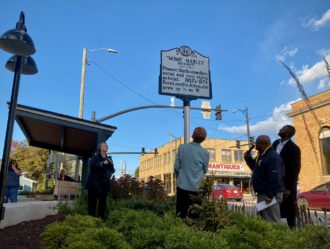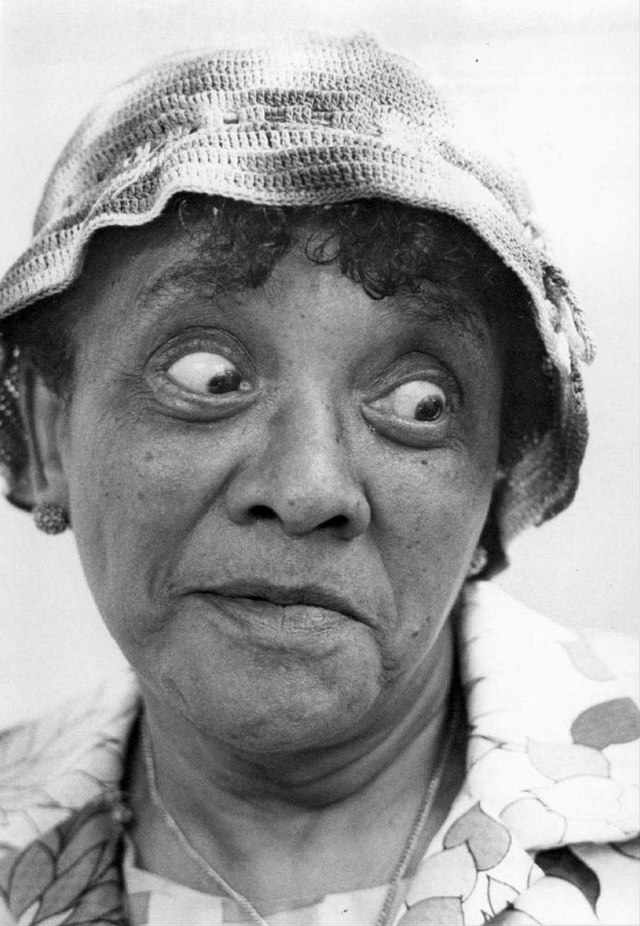By Adam Rosen
Before there was Phyllis Diller, Joan Rivers, Richard Pryor or even Ida Mae “Granny” Jensen (the wisecracking, man-hungry grandma from Eddie Murphy’s remake of The Nutty Professor), there was Brevard-born Moms Mabley.
Clad in a frumpy housedress, bucket hat and sporting a knowing, toothless smirk, Mabley appeared on stages and TV screens across the U.S. as a delightfully inappropriate senior with a penchant for dispensing down-home truths and not-so-thin sexual innuendos. Her finely honed act spanned some 50-plus years and transported her from a hustling road comic on the Chitlin’ Circuit to gold-certified recording artist — and, in 1962, the first woman comic (of any race) to headline Carnegie Hall.
Despite being widely considered one of the founders of stand-up comedy and “the funniest woman in the world” — as the marquees advertising her appearances so often put it — there was little official acknowledgment in her hometown of her accomplishments. That changed on Oct. 20, when the City of Brevard dedicated a historical marker to Moms on West Main Street.
What was involved in getting Moms her long-deserved recognition? In her famous words, “I got somethin’ to tell you.”
Early years in WNC
While specific details of Mabley’s early life are hazy and often contradictory — down to the year of her birth — here are the rough contours.
According to a research report prepared by Brevard’s assistant planning director, Aaron Bland, in advance of the marker’s dedication, Mabley was born Loretta Mary Aiken in 1894 or 1897. She was one of at least 10 children born to Mary Smith Aiken and James P. “Jim” Aiken, a local businessman and volunteer firefighter; Jim was the son of Jane Aiken Hall, a former enslaved person (like Jim, who was born in 1861), and her enslaver. The family lived in a two-story home on Oaklawn Avenue, less than a quarter-mile from Brevard’s present-day downtown, and enjoyed something of a middle-class existence.
In August 1909, the family’s world was upended when Jim died in an explosion while responding to a fire. To this day, he is believed to be the only firefighter in Brevard who died in the line of duty, says Bland. The tragedy hit the small town hard.
The Brevard News reported in a laudatory obituary that Aiken was “the most widely known colored man in Western North Carolina,” and his death was “a distinct loss to our town.” So many residents attended the funeral it had to be held at a larger white church nearby.
Details of Loretta’s life in Brevard after her father’s death are especially murky, but by most reputable accounts, it was extremely tumultuous. Her mother got remarried to a man Loretta did not get along with, and the couple eventually moved north, leaving Loretta in the care of her grandmother Jane. Sometime during this period, Loretta was raped twice and gave birth to two children.
The stage beckons
In the mid-1910s, Loretta took a trip up north and fell in with a traveling minstrel group on the Chitlin’ Circuit, the name for the network of entertainment venues catering to Black audiences during segregation. (She purportedly added three years to her age at the suggestion of her grandmother, which may explain the uncertainty over her exact year of birth.)
Like many stage performers at the time, dancing and singing were part of her skill set, but her quick-witted comic performances were her most popular offerings. At some point, she began billing herself as Jackie Mabley as a nod to a former boyfriend named Jack Mabley. (“I was real uptight with him, and he certainly was real uptight with me; you’d better believe. He took a lot off me, and the least I could do was take his name,” she explained in a 1974 interview in Ebony magazine.)
Along with the new name, she developed her bawdy, straight-shooting-old-woman persona of Moms — a character based, she said, on one of her own grandmothers. Eventually, she fully embraced her comedy alter ego, riding it to additional ticket sales and increasing fame.
In 1939, Mabley became the first performer to be given a solo show at the famous Apollo Theater in Harlem. In the view of Bambi Haggins, associate professor of film and media studies at the University of California-Irvine, this was a major milestone for both Mabley and the world of comedy.
Unlike a variety show, during a solo performance “it’s [just] you and the mic. There aren’t extras. It’s not a team. It’s not a sketch,” says Haggins, who has written extensively on Mabley and was featured in the Emmy-winning 2013 documentary, Whoopi Goldberg Presents Moms Mabley. “You have a clear persona, you have someone who becomes known for just being [a performer] and a mic.”
Mabley’s breakthrough with mainstream — i.e., white — audiences occurred in 1962 when she became the first woman to headline Carnegie Hall. In the mid-1960s, her act was netting her over $10,000 a week (a little less than $100,000 in today’s dollars), and she was making appearances on many of network TV’s biggest showcases, including “The Ed Sullivan Show,” “The Smothers Brothers Comedy Hour” and “The Flip Wilson Show.” By the time she died of heart failure in 1975, she’d also recorded approximately 20 comedy albums and taken roles in various TV and film projects.
Mabley was out for more than just laughs, however. As the Civil Rights era progressed, her comedy grew increasingly sharper, highlighting the glaring absurdities of racism and segregation. She had plenty of material.
Offstage, her life couldn’t have been more different from her limelight persona. Far from a dowdy old housewife, she was described in a 1962 Ebony profile as “a striking figure in tailored slacks, matching sports shirt, Italian shoes, horn-rimmed glasses — and teeth.” The writer noted, “She looks utterly sophisticated.” She also openly dated women.
In the view of Haggins and other commentators, Mabley’s “disguise” was both necessary and the source of her subversive comedic power. Her nonthreatening, hyperheterosexual persona effectively disarmed audiences, enabling her to go in for the kill. Had she continued to perform as the glamorous Loretta Mary Aiken, she may have never been afforded the same opportunity to provide her cutting social critique and observational humor.
Multigenerational laughs
While those steeped in comedy history have long regarded Mabley as a legend, a new generation of fans was introduced to her in December 2019 when Wanda Sykes (a fellow gay actor and comic, whose delivery style Haggins traces back to Mabley) portrayed Moms in the third season of the popular Amazon Original dramedy, “The Marvelous Mrs. Maisel.” The title character, Midge Maisel (played by Rachel Brosnahan), a stand-up trying to make her way in the male-dominated New York comedy scene in the 1950s and ’60s, crosses paths with Moms while warming up a crowd at the Apollo.
The episode caught the attention of Katie Bland, the wife of Brevard’s associate city planner Aaron Bland. A Transylvania County native, Katie mentioned Mabley’s Brevard connection to Aaron, who wasn’t familiar with the comedy icon.
Around the same time, Maurice Jones, a Brevard city councilman and relative of Mabley, brought up the idea of honoring her in some way to the city staff. As it turns out, they had actually done so years before. In 1997 — around the 100th anniversary of Mabley’s birth — the city renamed the street she was born on, Oaklawn Avenue, to Moms Mabley Avenue. According to the Transylvania County Library, however, “some residents protested having to change their addresses, and so the name was reverted to Oaklawn.”
At Jones’ request, Bland reached out to the N.C. Department of Natural and Cultural Resources, the state agency responsible for installing historical markers, about procuring one for Mabley. It was just a few months after the COVID-19 pandemic had begun, and Bland was told there were no funds to secure a marker. In 2022, however, the agency got back in touch to tell him that money was available and encouraged him to apply.
Enduring legacy
The application process involved submitting a report detailing Moms’ biography and cultural impact. With the help of another city employee, Bland crafted a deeply researched document incorporating more than 15 primary and secondary sources. The work was outside his usual responsibilities, but he says he relished the opportunity to help bring recognition that “was long overdue.”
“It was really fun to work on, and one of my prouder projects,” Bland says.

The NCDNCR approved the application, and an official dedication was scheduled. Dozens of attendees, including locals, city staff members and relatives of Mabley, showed up to the Oct. 20 event at the corner of Main and Caldwell streets. Tyree Griffin, the City of Brevard’s community center director and a third cousin of Mabley’s on his father’s side, was one of the speakers at the event and the person selected to unveil the marker.
“Her legacy in the town of Brevard reminds us all that even if you come from a small town, you too can go out and become somebody, no matter your ethnicity or upbringing,” Griffin says. “As far as her legacy she left on the world, I think it’s unmatched. Moms broke barriers, used her platform for social commentary, challenged stereotypes and paved the way for a more diverse and inclusive landscape in the world of entertainment.”
Whether Mabley invented stand-up comedy remains — like so much else about her — a topic of debate. But there’s no argument she was one of the first to popularize the form, serving as a bridge between the kinds of skits popular during the vaudeville era and longer monologues that evolved into stand-up.
Haggins also notes that Moms was “the first cougar” — an observation that she fondly recalls earned a big laugh from Goldberg during the documentary production.
For his part, Griffin’s favorite Moms joke is “If you don’t want your children to know the truth about life, don’t send ‘em to the theater to see Moms cause I’m gonna tell them the truth, hear?”
“I love this because it embodies what she stood for: children and truth,” he says.




Please forgive me but your facts are wrong when you said Moms was the first woman to have a show at Carnegie Hall in 1962…Judy Garland opened to a sold out performance at Carnegie in 1961.
Thank you for your comment. Moms was the first woman comic to headline Carnegie Hall. That detail has been added to the article.